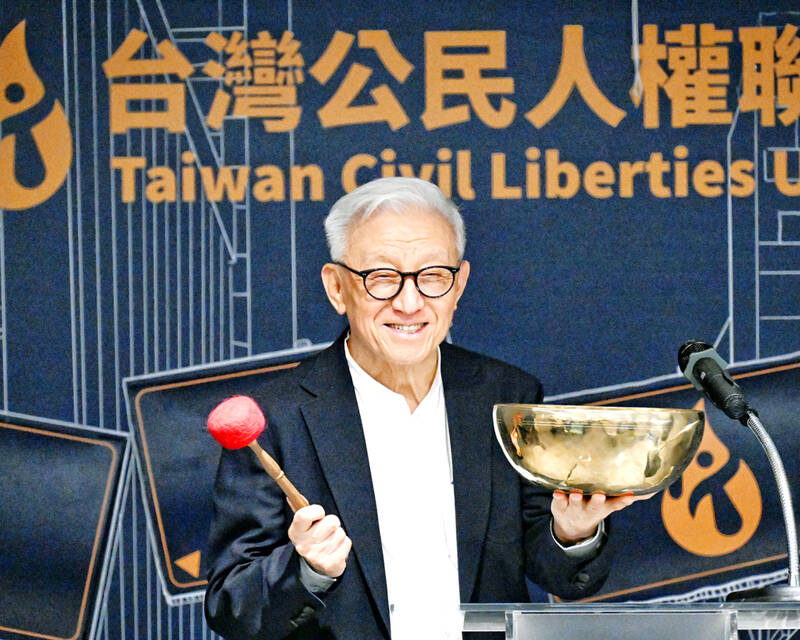Civil society must take the lead in judicial reform to shore up faith in a fair and just legal system, United Microelectronics Corp founder Robert Tsao (曹興誠) said at an event marking the launch of the Taiwan Civil Liberties Union in Taipei yesterday.
The backlog of cases, bad judgements and poor efficiency that persist in the justice system show that the government’s top-down efforts at judicial reform are more sound and fury than substance, he said.
The new organization — which takes inspiration from the American Civil Liberties Union — was created to consolidate human rights advocacy in Taiwan through a bottom-up social movement, he said.

Photo: Fang Pin-chao, Taipei Times
The low quality and inefficiency of the nation’s judiciary stem from an inappropriate trial structure, overreliance on prosecutorial authority in criminal investigations, criminalization of innocuous activities and lack of accountability of judicial officers, he said.
The Code of Criminal Procedure (刑事訴訟法) gives prosecutors power to appeal the result of a first trial, which renders the district court a toothless institution, Tsao said.
District court judges should be the main arbiters of criminal cases, and should have the power to dismiss meritless prosecutions with prejudice, he said.
Allowing prosecutors to try the same crime repeatedly contravenes Article 17 of the International Covenant on Civil and Political Rights and the double jeopardy principle of common law, while causing paralysis in the justice system, Tsao said.
The investigation and prosecution of crimes should be assigned separately to police and prosecutors according to principles of the division of labor and professionalism, he said.
Prosecutors lack the expertise to conduct investigations, unlike police, who have been trained in forensics and investigative techniques, he said, adding that requiring prosecutors to approve investigations adds red tape.
Many criminal offenses should be redefined as matters more appropriately governed by the Civil Code or legalized entirely, allowing police to focus on preventing and investigating serious crimes, Tsao said.
Libel should be treated as a civil offense to reduce unnecessary trials initiated by politicians that waste prosecutors’ and police resources, he said.
Perversion of justice by judges and prosecutorial abuse are breaches of Article 124 and Article 125 of the Criminal Code, but these laws are rarely invoked due to the reluctance of the justice system to regulate itself, Tsao said.
Entrusting the Ministry of Justice to reform itself was a mistake that stalled progress, and civil liberty advocates should focus on exerting legislative pressure, Tsao said.
The union would provide free legal counsel to the public in cases that concern civil liberties, and it would work with academics and lawmakers to promote positive change, he said.

Alain Robert, known as the "French Spider-Man," praised Alex Honnold as exceptionally well-prepared after the US climber completed a free solo ascent of Taipei 101 yesterday. Robert said Honnold's ascent of the 508m-tall skyscraper in just more than one-and-a-half hours without using safety ropes or equipment was a remarkable achievement. "This is my life," he said in an interview conducted in French, adding that he liked the feeling of being "on the edge of danger." The 63-year-old Frenchman climbed Taipei 101 using ropes in December 2004, taking about four hours to reach the top. On a one-to-10 scale of difficulty, Robert said Taipei 101

Nipah virus infection is to be officially listed as a category 5 notifiable infectious disease in Taiwan in March, while clinical treatment guidelines are being formulated, the Centers for Disease Control (CDC) said yesterday. With Nipah infections being reported in other countries and considering its relatively high fatality rate, the centers on Jan. 16 announced that it would be listed as a notifiable infectious disease to bolster the nation’s systematic early warning system and increase public awareness, the CDC said. Bangladesh reported four fatal cases last year in separate districts, with three linked to raw date palm sap consumption, CDC Epidemic Intelligence

Two Taiwanese prosecutors were questioned by Chinese security personnel at their hotel during a trip to China’s Henan Province this month, the Mainland Affairs Council (MAC) said yesterday. The officers had personal information on the prosecutors, including “when they were assigned to their posts, their work locations and job titles,” MAC Deputy Minister and spokesman Liang Wen-chieh (梁文傑) said. On top of asking about their agencies and positions, the officers also questioned the prosecutors about the Cross-Strait Joint Crime-Fighting and Judicial Mutual Assistance Agreement, a pact that serves as the framework for Taiwan-China cooperation on combating crime and providing judicial assistance, Liang

US climber Alex Honnold left Taiwan this morning a day after completing a free-solo ascent of Taipei 101, a feat that drew cheers from onlookers and gained widespread international attention. Honnold yesterday scaled the 101-story skyscraper without a rope or safety harness. The climb — the highest urban free-solo ascent ever attempted — took just more than 90 minutes and was streamed live on Netflix. It was covered by major international news outlets including CNN, the New York Times, the Guardian and the Wall Street Journal. As Honnold prepared to leave Taiwan today, he attracted a crowd when he and his wife, Sanni,